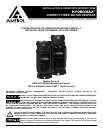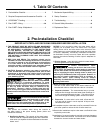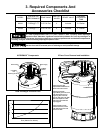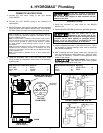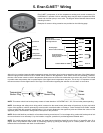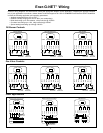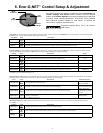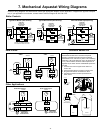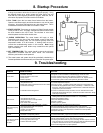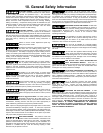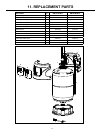
❑ THIS PRODUCT MUST BE INSTALLED AND MAINTAINED
BY A LICENSED PROFESSIONAL PLUMBER, ELECTRICIAN,
AS APPLICABLE. IN ADDITION TO THE INSTRUCTIONS
IN THIS MANUAL, FOLLOW ALL APPLICABLE LOCAL
AND STATE CODES INCLUDING MA CMR 248 OR IN THE
ABSENCE OF SUCH CODES, THE CURRENT EDITIONS OF
THE NATIONAL PLUMBING CODE AND THE NATIONAL
ELECTRIC CODE.
❑ DRIP PAN AND DRAIN: This appliance should not be
installed in an area where leakage of the tank or connections
can result in damage to the area adjacent to the appliance
or to lower floors of the structure. When such locations
cannot be avoided, a suitable drain pan, adequately drained
and kept clear, must be installed under the appliance.
❑ CAUTION: Determine whether your water is corrosive or
acidic, and that there are no suspended solids, toxic or other
substances or abnormally high chlorine levels in the water
that could damage or affect the water heater or the rest of
your plumbing system.
USE GLYCOL ONLY WITH
DOUBLE-
WALLED HEAT EXCHANGER
MODELS.
Glycol is a poisonous substance. To avoid
seepage or leakage of glycol to surfaces where humans or
animals can ingest it, use glycol only in double-walled units,
so that any leaks will most likely be released to the
atmosphere. However, a leak to a surface area may still
occur, so any use of glycol must be monitored closely and
humans and animals should be protected from contact with
the unit.
Do not connect the water heater
domestic
supply with baseboard or other space
heating units or elements. Any contaminants in the
baseboard units will contaminate the potable water in the
water heater and also adversely affect its performance.
❑ Wiring Options. Select either a Non-Priority or Priority
System:
Two options are available when wiring the controls of
the water heater in the space heating system (boiler and
distribution elements).
1. Non-Priority System - The controls of the water heater
must be wired as a separate heating zone with a standard
zone valve or a separate circulator dedicated to the water
heater “zone”.
NOTICE: In this non-priority option, the water heater will be
supplied just as another zone. This means that if all space
heating zones call for hot boiler water at the same time, the
water heater may not be supplied with enough hot boiler water
to “recover” adequately. The delivery of domestic hot water will
be diminished. In many, but not all cases, this is not a problem
because the routine oversizing of boiler output is adequate for
both loads.
2. Priority System - Under this wiring option the water heater
will be supplied before space heating.
In limited circumstances, space
heating can be lost in the home in this
priority mode. Any demand for space heating is postponed
until the water heater has reached its set temperature. This
delay in supplying the space heating zones is usually not
noticed by the inhabitants of the living spaces. However, in
the event of certain malfunctions such as circulator or
thermostat failure, space heating could be delayed
indefinitely. If undetected and uncorrected, freezing damage
to piping could result.
❑ Select Circulator versus Zone Valve
The flow of hot boiler water to the water heater
can be
controlled with either a motorized zone valve or a circulator.
1. Separate circulator. The recommended way to provide
adequate flow through the water heater heat exchanger is
to use a separate dedicated circulator. This option may be
used even though the heating system utilizes zone valves.
2. Zone valve If a zone valve is to be used, a flow rate of 3
to 5 gpm with all zones in use is required. A full-port zone
valve should be used.
❑ All installations require a low-water cut-off or automatic fill valve on
your boiler system to reduce the risk of boiler water loss.
❑ Steam boiler installations require a low-water cut-off which is also
required by most codes.
❑ Installation of a vacuum breaker is required to prevent damage to
the water heater when drained. There must be no valves installed
between the vacuum breaker and water heater.
2. Pre-Installation Checklist
IMPORTANT STEPS AND DECISIONS REQUIRED BEFORE INSTALLATION
-2-
1. Table Of Contents
2. Pre-Installation Checklist ...............................................
2
3. Required Components and Accessories Checklist .......
3
4. HYDROMAX
™
Plumbing ...............................................
4
5. Ener-G-NET
™
Wiring ..................................................
5-6
6. Ener-G-NET
™
Setup & Adjustment ...............................
7
7. Mechanical Aquastat Wiring ..........................................
8
8. Startup Procedure .........................................................
9
9. Troubleshooting .............................................................
9
10. General Safety Information .........................................
10
11. Replacement Parts ...................................................... 11



